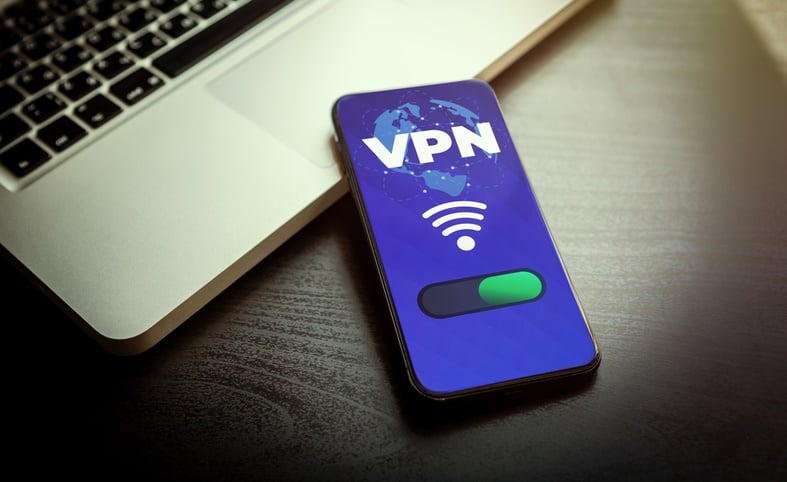
Table of Contents
What Is Online Privacy?
Online privacy or Internet privacy, a major topic in cybersecurity is the ability for an individual to control who can access and use their personal data, such as name, address, phone number, medical data, credit card information, etc. This includes preventing unauthorized access to confidential information by malicious actors or organizations. With the increasing presence of technology in our lives, understanding the importance of protecting one’s privacy is becoming more critical than ever. Digital privacy involves protecting an individual’s online activities from being monitored or tracked by your internet service provider, malicious software, and mobile apps. A popular way to protect online privacy is to use a virtual private network (VPN), which masks an individual’s IP address and encrypts their internet traffic.
Data breaches, identity theft, online tracking, and other similar activities are all possible threats to online privacy that have recently been on the rise due to advances in technology. In response to these threats, governments around the world have implemented legislation such as the General Data Protection Regulation (GDPR) which provides individuals with more control over their data when it is shared with companies and organizations. The GDPR also ensures that companies comply with data protection standards when dealing with customers’ personal information. Ultimately, online privacy must be taken seriously since it is a fundamental right for all individuals and should be protected at all costs.
Why Is Online Privacy Important?
Online privacy is important for a variety of reasons. For starters, it helps protect personal information and data from being accessed by hackers, criminals, or other malicious actors. It also helps protect users from being tracked or monitored as they browse the web, which can lead to a loss of privacy and potential identity theft. Additionally, online privacy is important because it helps protect users from having their data used for advertising or other purposes without their knowledge or consent.
In this digital age, it is becoming increasingly important to protect yourself against the potential misuse of your personal data. By taking steps to protect your online privacy, you can help protect your identity and ensure that your data remains secure. This includes using strong passwords, avoiding online scams, and using private browsers when possible. Additionally, it is important to be aware of potential privacy leaks when using social media or other websites that may collect and share your data.
Data Privacy as a Right
Data privacy is a fundamental right that ensures individuals have control over their personal information and how it is collected, stored, and used by organizations. Upholding data privacy as a right is essential to protect individuals from unauthorized access, misuse, and exploitation of their personal data, preserving their autonomy and dignity in the digital age. It empowers individuals to make informed choices about their privacy settings, maintain confidentiality in their communications, and safeguard their personal and professional relationships. Recognizing data privacy as a right is crucial for fostering trust, transparency, and accountability in the digital ecosystem, as well as promoting the fair and ethical handling of personal information by businesses, governments, and other entities.
Information Privacy
Information privacy is an increasingly important topic in today’s digital age, as the amount of data that can be collected and stored by companies continues to grow, such as Google, Facebook, and Amazon for targeted advertisements or other purposes. Information privacy has become even more relevant with the rise of targeted advertising and sophisticated tracking techniques used by companies to monitor user activity. In order to protect their personal information and ensure that it is not shared without their consent, users must take steps to secure their online activities through the use of encryption with most private VPNs technologies and other methods. Furthermore, it is necessary for individuals to understand what types of data are being collected about them in order for them to make informed decisions about how they interact with technology.
Security vs. Privacy
Security is concerned with protecting data from unauthorized access or manipulation; while privacy involves controlling who has access to personal information about an individual or organization. Privacy online refers to a user’s ability to control how their digital information is collected, used, shared, and stored by third parties. Today’s digital ecosystem introduces new threats that can compromise both security and privacy. For instance, weak passwords or unsecured Wi-Fi networks can be exploited by cybercriminals to gain access to sensitive data like medical records or financial information. Furthermore, official app stores may not vet apps thoroughly enough, leaving users exposed to malicious content or malware designed to steal data. As technology continues to evolve at a rapid pace, it is essential for individuals and organizations alike to stay vigilant with regard to their online security and privacy measures in order to protect their confidential information from falling into the wrong hands.

Major Online Privacy Issues
Navigating the digital landscape poses many challenges when it comes to protecting security and privacy. Major issues related to online privacy include the use of web browsers, data privacy, password managers, public Wi-Fi networks, and tech companies. Below are major controversial practices that can cause massive data breaches:
Search Engines User Tracking
Search engines have become an integral part of our daily lives, yet the potential implications to our privacy and security must not be overlooked. As we browse the web, search engines track and store data about us such as what websites we visit, what terms we search for, and even our financial information. Search engines can track, IP addresses, search history, and cookies, This data is then used to generate targeted ads which can leave users vulnerable to security issues.
In order to protect your privacy while using a search engine, it is important to consider using browser extensions that can block tracking scripts or limit how much of your personal information is shared with advertisers. Always remember to delete Google search history after browsing sessions. Additionally, many search engines now offer more robust settings that allow you to customize how much data you are willing to share with them. Users can also consider using private DNS sine most public DNS have vulnerabilities. By taking these steps you can help ensure your online privacy when using a search engine.
Social Media Data Harvesting
With the rise of social media, users must be aware of the potential implications to their privacy and security through online accounts. Social media platforms are widely popular, with millions of users worldwide. It is important for users to be mindful and understand how much personal information they are sharing when using apps and websites such as Facebook, Twitter, Instagram, etc. The more personal information shared in these online spaces can potentially increase the risk of an individual’s online privacy being compromised.
This is important:
Furthermore, it is important for individuals to actively manage their privacy settings on each app or website they use in order to protect themselves from any unwanted violations or breaches. Allowing access to certain apps or websites can also potentially put an individual’s personal information at risk if not managed properly. Therefore, it is essential that users are aware of how much online privacy they have and take necessary measures to protect this important aspect of their life.Cookies/Tracking
When browsing the internet, many websites use cookies and tracking technologies in order to identify user behavior and store information for future visits. Cookies are small text files that contain a string of characters that allow websites to recognize visitors when they return to the site. They can be used for authentication purposes or even to personalize content on the website. Tracking technologies such as web beacons or pixel tags can also be used by websites to track user activity including page views, clicks, mouse movements, scroll events, and even text messages sent between users. These tracking technologies can also help companies understand how a user interacts with their website and services in order to improve the overall experience of their visitors.
Mobile Apps and Privacy
Mobile apps have become a popular way for users to interact with services, and as such, they present unique challenges in regard to user privacy. Most Android phones come pre-loaded with many apps that the user may not even be aware of or need. Additionally, when downloading a new app, users are often required to agree to certain terms and conditions which can include access to various data from their device. To protect their online privacy while using mobile apps, it is recommended that users consider blocking ads and installing security features on their phones. Ad blockers can help prevent companies from utilizing personal data collected via ads while security features will protect all of the sensitive information stored on your device if someone were able to gain access to your phone. Also, you can use apps that have encryption features such as WhatsApp, encrypted note-taking apps, Telegram and more.
Identity Theft
Identity theft is a serious risk to individuals, as it can result in financial losses and damage to one’s reputation. It involves the unauthorized use of an individual’s personal information, such as their name, social security number, or other sensitive details, by identity thieves for financial fraud or other privacy-invading practices. Personal devices are increasingly being targeted by hackers due to their popularity and the amount of personal data they contain. This creates a large digital footprint that can be used by criminals for identity theft purposes.
To protect against identity theft, individuals should take extra measures to secure their personal information on all devices they use and be wary of unsolicited emails or messages that request sensitive information. Furthermore, monitoring bank accounts regularly can help detect any suspicious activity quickly.
Security Tips To Protect Your Privacy Online
Here are some security tips to protect your privacy online:
- Use strong, unique passwords for each online account.
- Enable two-factor authentication whenever possible.
- Keep your devices and software up to date.
- Be cautious when sharing personal information online.
- Avoid clicking on suspicious links or downloading files from unknown sources.
- Use reliable antivirus and firewall software.
- Be mindful of the information you share on social media.
- Regularly review and adjust your privacy settings on websites and social media platforms.
- Use a virtual private network (VPN) when accessing the internet on public Wi-Fi networks.
- Regularly back up your important data.

Government Regulations
Government regulations have been established to protect individuals from the potential risks of identity theft in the digital age. Data security laws are designed to ensure that personal information such as browsing information, sensitive information, and other data collected during online activities is not made available to other websites or third parties without a user’s expressed permission. Such regulations also protect users from being tracked and monitored online without their knowledge.
Additionally, these safeguards give users control over how their personal data is used by websites or companies that collect it. These laws help establish trust between businesses and customers as well as provide more transparency regarding what type of data is collected and how it will be used. Furthermore, they can help reduce the risk of identity theft by ensuring that users’ personal information isn’t shared with those who shouldn’t have access to it.
Data Minimization
Data minimization is a strategy that aims to limit the collection and use of personal data, thereby reducing the risk of identity theft. This strategy involves only collecting the data necessary to provide a service or fulfill a purpose. Companies should collect only enough data to provide the desired services and no more. For example, companies should not ask for phone numbers if they are not needed for providing services, nor should they ask for birth dates or tax returns unless absolutely necessary. Furthermore, tech giants like Google and Facebook have started to implement data minimization techniques in their ad personalization algorithms by only collecting certain user information that will be useful for providing personalized ads while omitting sensitive details such as location or gender information from being collected. Some other ways companies can apply data minimization include:
- Limiting access to customer’s personal information to authorized personnel
- Regularly reviewing and deleting unnecessary customer data
- Thoroughly assessing third-party vendors before sharing any customer information with them
- Minimizing how long customer data is retained within business applications
- Incorporating privacy into product design processes at an early stage
- Establishing clear policies on the use of personal information throughout all departments in order to ensure compliance with regulations like GDPR or CCPA etc.
- Training employees on company privacy policies so they are aware of what type of customer information needs protection under these laws
- Make sure customer consent is obtained before using their personal details for marketing purposes etc.
Network Security
Network security is an essential element in the modern digital landscape, protecting data, systems, and applications from malicious activity. In order to protect against phishing attacks and other attempts to gain unauthorized access to computers, networks must be secured with properly configured firewalls and other security measures. This helps safeguard against prying eyes or malicious actors attempting to acquire restricted information.
Moreover, network security can also help prevent unwanted applications or malware from infiltrating the system. Network security is important for keeping valuable data safe while preventing hackers from accessing sensitive material without permission. It also serves as a deterrent for those who would seek to compromise a computer system for personal gain or malicious intent. By implementing strong network security measures, organizations can protect their assets from potential threats and keep data secure from external sources of danger.
Frequently Asked Questions
What Is the Difference Between Data Privacy and Information Privacy?
Data privacy is concerned with the security of data stored on computers, networks, and other digital devices. It generally includes measures such as encryption, access control, authentication protocols, and network segmentation. Information privacy focuses on protecting people’s personal information from unauthorized access or use. It typically involves regulations such as those governing the collection, storage, retention, and destruction of private data.
How To Ensure Your Data Is Secure on Search Engines?
To ensure the security of your data on search engines, use search engines that prioritize privacy and employ strong encryption methods, such as HTTPS. Additionally, consider using browser extensions or plugins that enhance privacy by blocking tracking cookies and preventing search engines from collecting your personal information. Lastly, regularly clear your browsing history, cookies, and cache to minimize the data stored by search engines.
How Can You Minimize the Data That You Are Sharing With Mobile Apps?
One way to do this is by controlling which permissions you grant mobile applications when installing them. Before downloading an app, verify what access and information the application requires and only give permission for the necessary functions. You can disable some of the default settings that may compromise your privacy, unless they are needed for the app to function. Additionally, consider disabling location tracking services or allowing access only while using the application. To further protect yourself, read third-party reviews and research an app before downloading it as some apps may collect more than necessary data or have malicious intent. Finally, regularly check your phone’s settings to ensure that installed apps are not accessing unnecessary data in the background.
Conclusion
In conclusion, online privacy is an important concept in today’s digital age. Understanding the different ways data can be collected and used, as well as measures that can be taken to protect one’s security and privacy is essential. Data minimization is a strong strategy to protect oneself from malicious actors, while government regulations are also playing their part in protecting citizens’ data. It is up to individuals to take steps to become informed and stay aware of the risks associated with sharing personal information online. With this knowledge, people can make informed decisions about what they share and how it should be protected.

